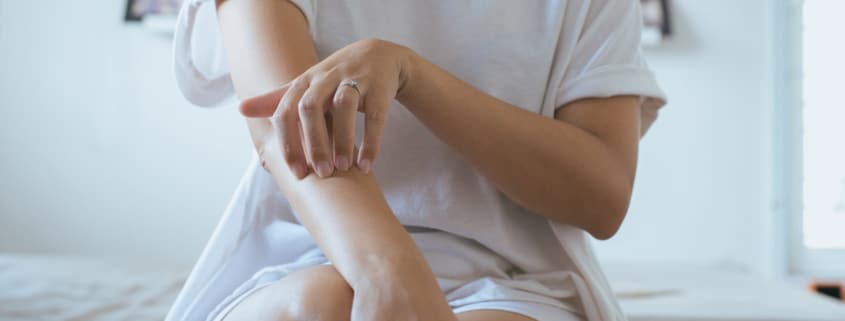What is eczema and what can you do to help with the symptoms?
Atopic dermatitis, also known as eczema, is a common skin condition that affects nearly 32 percent of people in the United States. The condition is characterised by patches of skin that become inflamed, itchy, scaly red, cracked and rough. It commonly occurs in infants, but can continue through to adulthood if the individual does not address the cause of the condition.
So what is the cause of the condition?
There is no one cause of eczema, the condition has a different cause per case that can develop due to a combination of genetic and environmental factors. For example, if both parents have had eczema the risk of a child inheriting this is much greater. The specific environmental factors are vast but may include:
- Irritants like soaps, detergents, shampoos
- Allergens like dust mites, mold or dandruff
- Microbes including fungi, viruses and bacterial infections
- Hot and cold temperatures can exacerbate underlying eczema
- Certain foods, particularly dairy, eggs, wheat and soy products
- Hormonal fluctuations, particularly in the case of women who suffer more eczema flare ups at times of hormonal change like during pregnancy and certain points in the menstrual cycle
Another factor that has been closely linked to eczema flare ups is stress. Stress exacerbates any of the above contributors, so if you know that you have high stress levels as well as one or more of the above, you are way more likely to have frequent or sustained eczema. So manage your stress! Meditate, take baths, go for walks, try to lower your stress set point to help your body heal.
I have eczema, what can I do?
Eczema feels dry, flakey, may burn or feel itchy. These aren’t particularly nice symptoms, particularly if they affect an obvious area like the face. So it’s understandable that you want relief and you want it now! Here are some things you can do to help:
- Know your triggers, try to halt them in their path before they result in a major flare ups.
- Moisturise! Find a natural moisturiser without all the nasty chemicals and put it on your skin at least twice a day after showering. The best type of product will contain no dyes or perfume.
- Apply an anti-itch cream to the affected area after moisturising like hydrocortisone cream.
- Don’t scratch your skin! This may be hard but the less you scratch it, the quicker it heals. Try pressing on the skin if you really need some relief.
- Wear loose clothing. Tight clothing made of poor quality material will make eczema worse as your skin is not able to breathe.
- Take a bath. Not only does this help with stress, but water is also a great eczema therapy. Bathe in lukewarm water ideally.
- Find products that work for you.
The Beauty of Action’s has various skin solutions for eczema. This helps to rebalance the moisture lost in the skin during an eczema flare up.
Eczema is not fun, you may feel embarrassed, self conscious or even just frustrated. You don’t have to feel like this. Try following the aforementioned steps and manage your stress levels and you will be noticing some great improvements.





Leave a Reply
Want to join the discussion?Feel free to contribute!